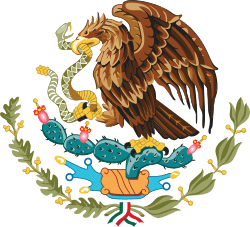Mexico–Mozambique relations
Mexico–Mozambique relations refers to the diplomatic relations between the United Mexican States and the Republic of Mozambique. Both nations are members of the United Nations.
 | |
Mexico |
Mozambique |
|---|---|
History
During the Atlantic slave trade, Portugal and Spain transported many African slaves from Mozambique to Mexico where they arrived primarily to the port city of Veracruz.[1] In June 1975, Mozambique gained its independence from Portugal. Mexico and Mozambique established diplomatic relations on 26 February 1988.[2] Since the establishment of diplomatic relations; relations between both nations have taken place primarily in multilateral forums such as the United Nations.[2]
In October 1986, Mexico called for an inquiry into the death of Mozambican President Samora Machel at the United Nations after his plane crashed in South Africa.[3] In June 1999, Mexican Foreign Minister Rosario Green met with Mozambican President Joaquim Chissano while both were attending the inauguration for South African President Thabo Mbeki in Pretoria.[4] In March 2002, Mozambican Prime Minister Pascoal Mocumbi paid a visit to Mexico to attend the Monterrey Consensus.[5] During his visit, Prime Minister Mocumbi met with Mexican President Vicente Fox.
In December 2010, Mozambican Minister of the Environment, Alcinda Abreu, paid a visit to Mexico to attend the 2010 United Nations Climate Change Conference in Cancún.[6] In October 2015, Mozambican Minister of Justice José Ibraimo Abudo paid a visit to Mexico and met with Mexican National Human rights Commissioner, Luis Raúl González Pérez. During the visit, both nations agreed for joint activities to be developed in the field of protection and dissemination of human rights, training and advice between both nations.[7]
High-level visits
High-level visits from Mozambique to Mexico
- Prime Minister Pascoal Mocumbi (2002)
- Minister of the Environment Alcinda Abreu (2010)
- Minister of Justice José Ibraimo Abudo (2015)
Bilateral agreements
In 2004, both nations signed an Agreement in Educational and Cultural Cooperation. Both nations are currently negotiating a Memorandum of Understanding for the Establishment of a Consultation Mechanism in Matters of Mutual Interests.[2]
Trade
In 2018, trade between both nations totaled US$14 million.[8] Mexico's main exports to Mozambique include: dairy based products; tractors; refrigerators; cards provided with an integrated circuit chip; electronics; perfumes; and malt beer. Mozambique's main exports to Mexico include: tobacco, ilmenite, modular circuits, modules band tuners, vermiculite, and dissected zoological specimens and their parts.[2]
Resident diplomatic missions
- Mexico is accredited to Mozambique from its embassy in Pretoria, South Africa.[9]
- Mozambique is accredited to Mexico from its embassy in Washington, D.C., United States.[10]
References
- Afrodescendientes en México (in Spanish)
- Bilateral relations between Mexico and Mozambique (in Spanish)
- Cronologia de Noticicias de México: 1987 (in Spanish)
- Historia de las Relaciones Internacionales de México: page 142 (in Spanish)
- Summit-level participation: Mozambique
- COP16
- CNDH: José Ibraimo Abudo (in Spanish)
- "Mexican Ministry of the Economy: Mozambique (in Spanish)". Archived from the original on 2019-07-28. Retrieved 2019-12-03.
- Embassy of Mexico in South Africa
- Embassy of Mozambique in the United States

